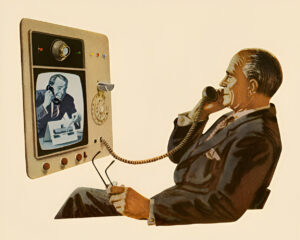The Evolution of Communication: Communication has always been a cornerstone of human civilization. From cave paintings to written language, the methods through which humans share information have evolved dramatically over the centuries. Among these advancements, the invention of the telephone stands out as a transformative breakthrough that reshaped human interaction, commerce, and society at large. This article explores the history of the telephone, its impact on human communication, and its ongoing evolution in the digital age.
Early Communication Methods

Before the advent of the telephone, long-distance communication was limited to written messages carried by messengers, pigeons, or mail services. These methods were slow, often unreliable, and restricted by geography. The telegraph, invented in the early 19th century, marked a significant improvement by enabling near-instantaneous transmission of coded messages over long distances. However, it was the invention of the telephone in 1876 by Alexander Graham Bell that truly revolutionized personal and business communication.
The Invention of the Telephone

Alexander Graham Bell’s invention of the telephone was a pivotal moment in communication history. On March 10, 1876, Bell made the first successful telephone call to his assistant, Thomas Watson, uttering the famous words, “Mr. Watson, come here, I want to see you.” This breakthrough allowed for real-time, two-way voice communication over long distances, effectively shrinking the world and making it possible for people to connect in ways previously unimaginable.
Early Adoption and Expansion

The early years of the telephone were marked by rapid technological advancements and widespread adoption. By the turn of the 20th century, telephone lines were being laid across cities and countries, connecting homes, businesses, and government offices. The establishment of switchboard operators and exchanges facilitated more efficient call routing, making the telephone a staple of modern life.
Impact on Society and Business
Personal Communication

The telephone had a profound impact on personal communication, bringing families and friends closer together regardless of distance. It bridged gaps between cities, states, and even countries, allowing people to maintain relationships and share experiences in real time. This instant connectivity transformed social dynamics and established a foundation for the globalized world we live in today.
Business and Commerce

In the business realm, the telephone revolutionized how companies operated. It enabled quicker decision-making, streamlined operations, and opened new avenues for customer service and sales. Businesses could now communicate with clients and partners across the globe, fostering international trade and economic growth. The telephone also gave rise to industries such as telemarketing and customer support, which remain integral to modern commerce.
Technological Advancements
Mobile Telephony

The development of mobile telephony in the mid-20th century marked the next major leap in communication technology. The introduction of the first commercially available mobile phone, the Motorola DynaTAC 8000X, in 1983, brought the freedom of communication without the constraints of wires. Mobile phones quickly evolved from bulky, expensive devices to sleek, affordable smartphones, becoming ubiquitous tools for personal and professional communication.
The Digital Age

The transition from analog to digital technology in the late 20th century further revolutionized telecommunication. Digital phones offered clearer voice quality, greater security, and additional features such as texting, internet access, and multimedia capabilities. The rise of the Internet and Voice over Internet Protocol (VoIP) services like Skype and WhatsApp enabled free or low-cost global communication, reducing barriers and fostering even greater connectivity.
The Social and Cultural Impact
Globalization

The telephone played a crucial role in the process of globalization, enabling instant communication across continents and time zones. It facilitated international diplomacy, global business operations, and cultural exchange. The ability to communicate quickly and effectively helped break down geographical barriers, creating a more interconnected and interdependent world.
Emergency Response

The telephone has also been a critical tool in emergency response and public safety. The establishment of emergency numbers like 911 in the United States allowed for quick access to police, fire, and medical services, saving countless lives. The integration of mobile phones with emergency alert systems has further enhanced public safety, providing real-time information and assistance during crises.
The Future of Telecommunication
As we move further into the 21st century, the landscape of telecommunication continues to evolve. The advent of 5G technology promises faster, more reliable mobile connectivity, enabling advancements in areas such as autonomous vehicles, smart cities, and the Internet of Things (IoT). Artificial intelligence and machine learning are also poised to enhance communication systems, providing more personalized and efficient interactions.
The telephone has undeniably transformed human history, changing the way we connect, conduct business, and live our daily lives. From Alexander Graham Bell’s first call to the latest smartphone innovations, the evolution of the telephone reflects the broader progress of human civilization. As technology continues to advance, the telephone will undoubtedly remain a fundamental tool for communication, driving further societal and cultural transformation.







